Amidst the dense buildings of Hong Kong, Anna’s (pseudonym) tiny home resembles a vibrant mini art gallery. The walls display the blue seas and golden sun of her native Sri Lanka, the bunk bed is adorned with boldly colored mermaid paintings, and handcrafted ornaments by the window sway gently in the breeze—each piece narrating the story of an asylum seeker’s unyielding spirit. Yet, this solitary artist faces a hidden daily struggle: maintaining a comfortable home while battling kidney disease.
Survival Choices in a Small Space
Unable to work legally in Hong Kong due to her immigration status and living on minimal allowances, utility bills once weighed heavily on Anna. This stress not only consumed her creative time but also jeopardized her health—doctors emphasized the need for a well-ventilated environment and stable temperature for kidney disease patients. However, faced with high or unfairly inflated utility charges by landlords, comfort seemed unattainable.
A Vast Soul in a Small Space
Entering Anna’s small world, one is most touched not by the colorful paintings or intricate bracelets, but by the creativity that thrives despite her illness. She delightfully gifts handmade ornaments to visiting friends. Showing a seascape, she shares, “I paint thinking of my hometown.” This dedication is her gentle shield against loneliness and disease.
STAR Program: Making Home a Safe Haven
The financial assistance from the Branches of Hope’s STAR programme has relieved Anna of a significant burden. Your kind support has provided:
- Dignity in Life: A freedom from anxiety over basic utility costs, restoring comfort to daily living
- Health Protection: Consistent ventilation and clean water alleviate physical stress whilst electricity security enables home dialysis treatments
- Creative Freedom: A stable environment nurtures Anna’s spirit, enabling her to uphold dignity and brilliance through her art
In the waves and starlight Anna paints, we witness a woman anchoring hope through art. Your support via the STAR program not only supports her health needs but also safeguards the creativity of her canvas. Your generosity transforms every unit of electricity into starlight on her canvas and every drop of water into nourishment for the artistic flowers blooming amidst adversity.
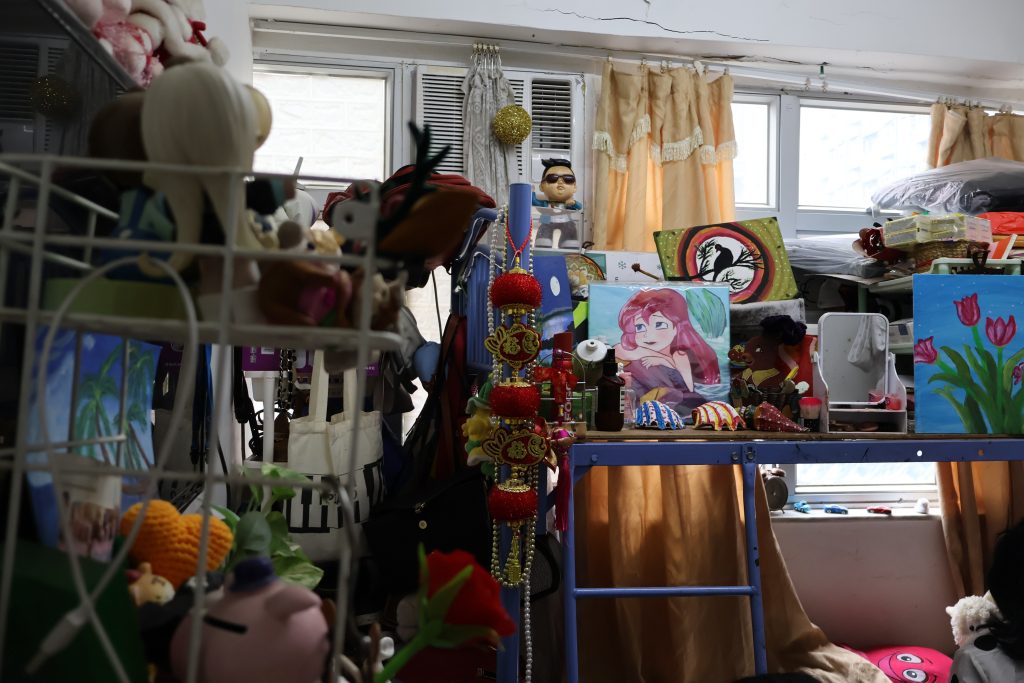
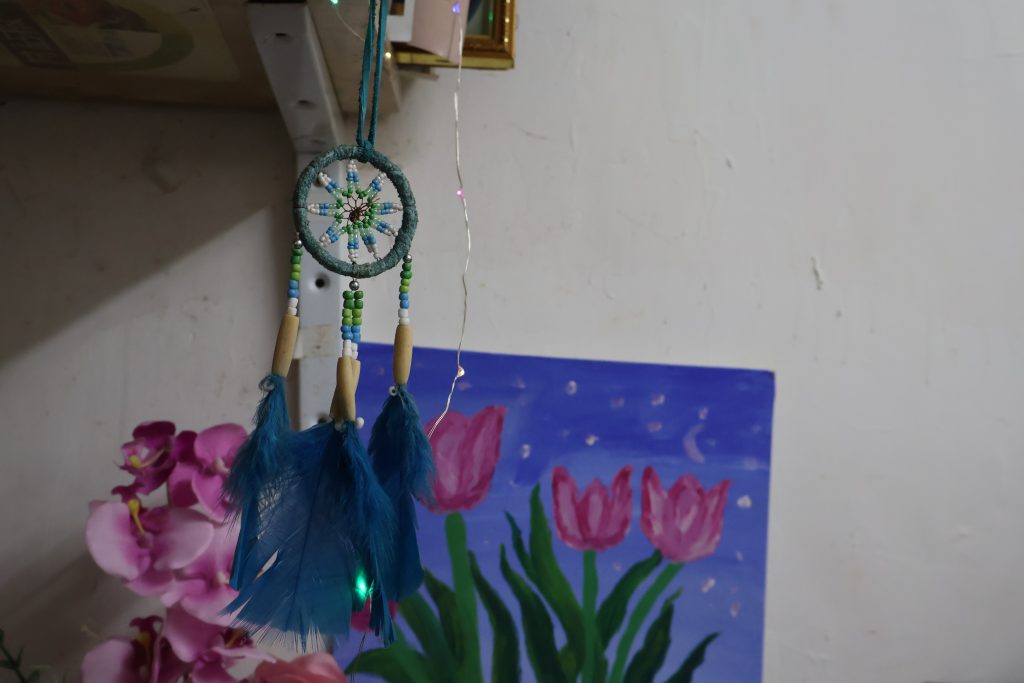
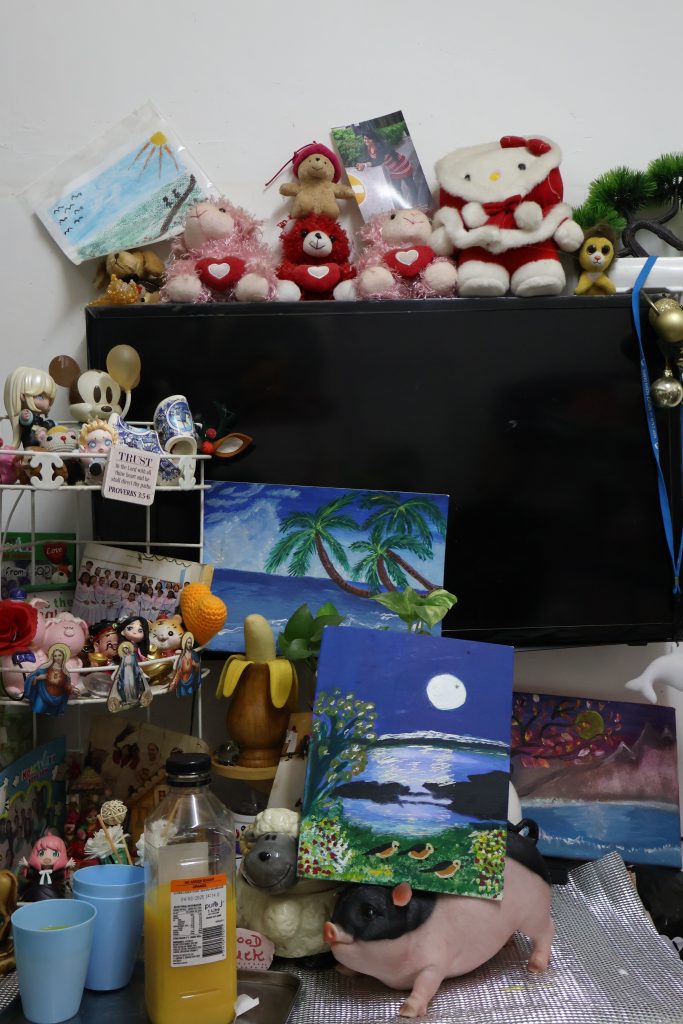
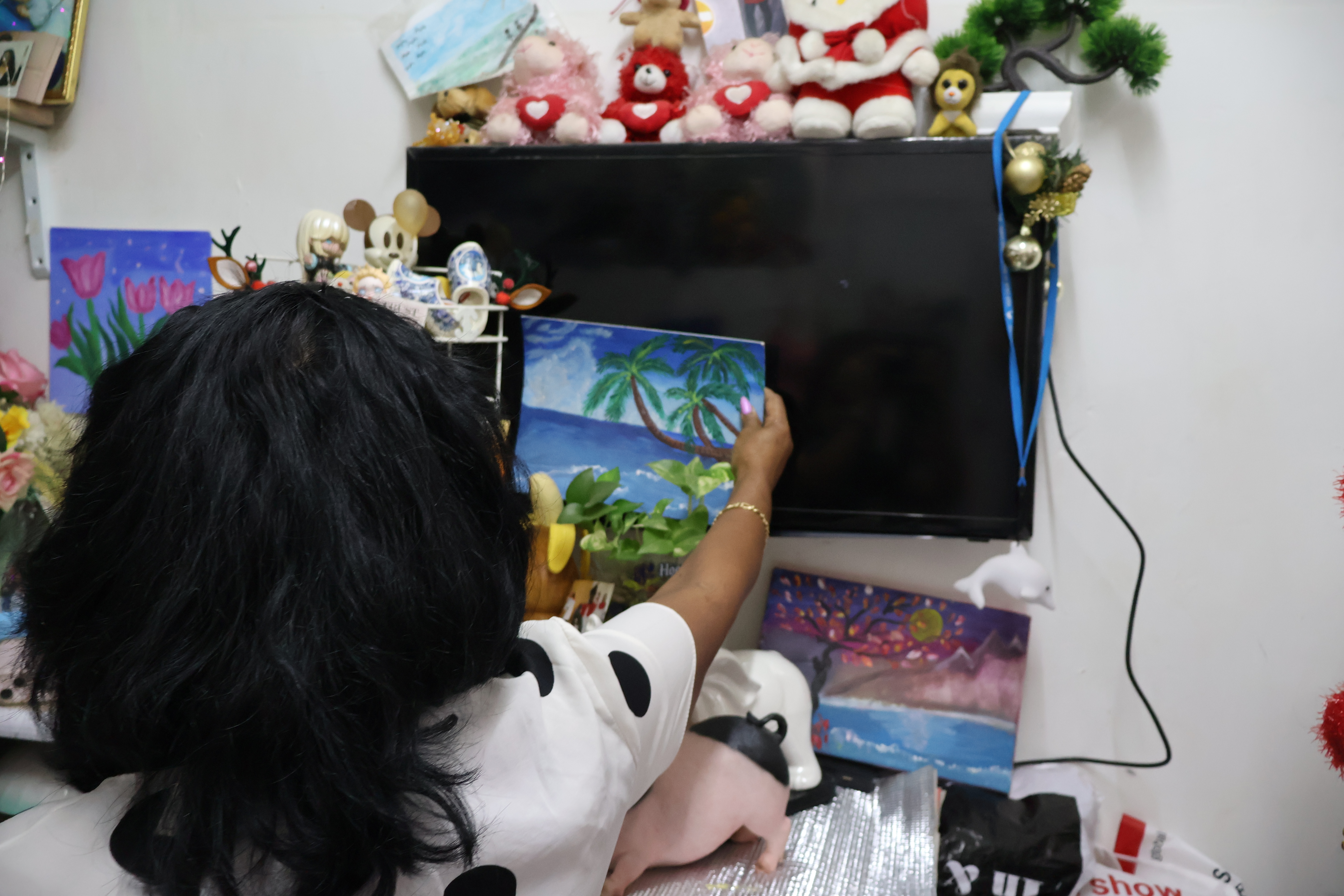
畫布上的星光:STAR計劃守護Anna的家與對生命的希望
在香港密集的樓宇之間,Anna(化名)的家宛若一座躍動著生命力的微型藝廊。墻上鋪展著斯里蘭卡故鄉的碧海金陽,雙層床上堆疊著色彩大膽的美人魚畫作,窗邊垂掛的手工編織飾品隨風輕舞——每件作品都訴說著這位免遣返聲請人未被逆境磨滅的熾熱靈魂。然而,這位獨居的藝術家正面臨一場無聲的考驗:在腎病困擾下,如何守護一個舒適的家。
病痛中的生存抉擇
對於身份限制,無法在香港合法工作,僅靠微薄津貼維生的Anna而言,水電費曾是她的千斤重擔。這份壓力不僅侵蝕著她的創作時光,更對她的健康構成威脅。醫生一再叮囑,腎病患者需保持環境通風與室內溫度穩定,但面對被業主不合理加價的高昂賬單,舒適的居住環境對她而言幾乎是遙不可及的奢望。
狹小空間的創作之光
踏入Anna的小天地,最動人的不是那些絢麗的畫作與精致手鏈,而是病痛中依然蓬勃的創造力。每當朋友探訪,她總歡喜地將親手製作的飾品贈予對方,分享她對藝術的熱愛。展示著手中的海景畫時,她說:「畫這畫時,我想著我的家鄉。」這份對藝術的執著,成為她對抗孤獨與病魔的堅強後盾,讓她的心靈在狹小空間中依然無比寬廣。
STAR計劃:讓家成為避風港
希望枝子的STAR計劃為Anna帶來了轉機。透過水電費的資助,您的善心化為實實在在的改變:
- 生活尊嚴:不再為基本水電費焦慮,舒適環境重歸日常
- 健康守護:穩定通風與清潔水源,減輕身體負荷;更為即將到來的居家洗腎鋪設電力保障
- 創作自由:安穩空間滋養精神世界,讓她在病痛中持守尊嚴與光芒
在Anna筆下的海浪與星光中,我們看見一位女性用藝術錨定希望。通過捐助STAR計劃,不僅守護了她的健康,更守護了畫布上那片永不褪色的海洋。每一筆捐助,都在點亮暗夜中依然閃耀的生命星光。您的慷慨,讓每一度電,化作畫布上的星芒;每一滴水,滋潤著逆境綻放的藝術之花。
In the bustling metropolis of Hong Kong, hidden corners shelter many who quietly strive to find a way forward. Lisa, an asylum seeker from Russia, lives in a 100-square-foot subdivided flat with her 6-year-old son James, who has just started primary school. Together they are working to build a small world filled with love and hope. As a non-refoulement claimant, Lisa’s case is still navigating a lengthy process. Restricted by her immigration status, she cannot legally work in Hong Kong, and the weight of life’s uncertainties tests this single mother’s resilience every day.
Stepping into Lisa and James’s home, the space is tiny but meticulously utilized. Your eyes are quickly drawn to the vibrant paintings and handmade crafts adorning the walls and furniture—James’s creations, treasures that Lisa holds dear. In a city where every inch is precious, Lisa nurtures her son’s spirit in her own way: she handcrafts delicate fabric pieces at home, not only as a way to pass the long waiting days but also as a silent lesson in love and creativity for James.
For Lisa and James, this modest flat is more than a place to live—it’s a fortress against the storms of the outside world. Yet, maintaining the basics of this “home”—like paying for utilities—was once a heavy burden for Lisa, who has no steady income. Beyond meager government aid (just HK$1,200 per person monthly in food vouchers, high or potentially inflated utility bills by landlords often forced Lisa to hesitate in the stifling summer heat, wondering whether to turn on a fan or air conditioner in their poorly ventilated space.
The kind donors of Branches of Hope’s STAR Program provided Lisa’s family with utility bill assistance. This support, while seemingly addressing a financial issue, has brought tangible improvements to their quality of life and peace of mind. They can now use appliances like fans without worrying about extra costs, ensuring their small space remains minimally comfortable during extreme weather, safeguarding James’s health and study environment. James can do homework and read under bright lights. Most importantly, this stability preserves their cherished parent-child bond. Lisa shares their most treasured routine: “Even in such a small space, we cherish every evening when we open our tiny foldable table on the bed to build LEGO or play with toys together.”
Lisa and James’s story reflects the experiences of many families supported by the STAR Program. Every donation does more than settle a utility bill. It upholds basic dignity, enabling struggling families to maintain a clean, safe, and minimally comfortable living environment. It protects physical and mental well-being, preserving warm, shared moments for families like Lisa and James during their toughest times. Above all, it reassures them that they are not alone in their long wait, that society’s care and support are ever-present.
In Lisa’s tiny flat, adorned with James’s artwork, we witness the greatness of a mother’s love, a child’s creativity blooming despite adversity, and the kindness of key supporters enacted through the STAR Program into a tangible force that protects this hope and warmth. For those who support this program, thank you for walking alongside Branches of Hope and taking action to support those awaiting a brighter dawn. Your generosity is lighting lamps of hope in the smallest corners of Hong Kong.
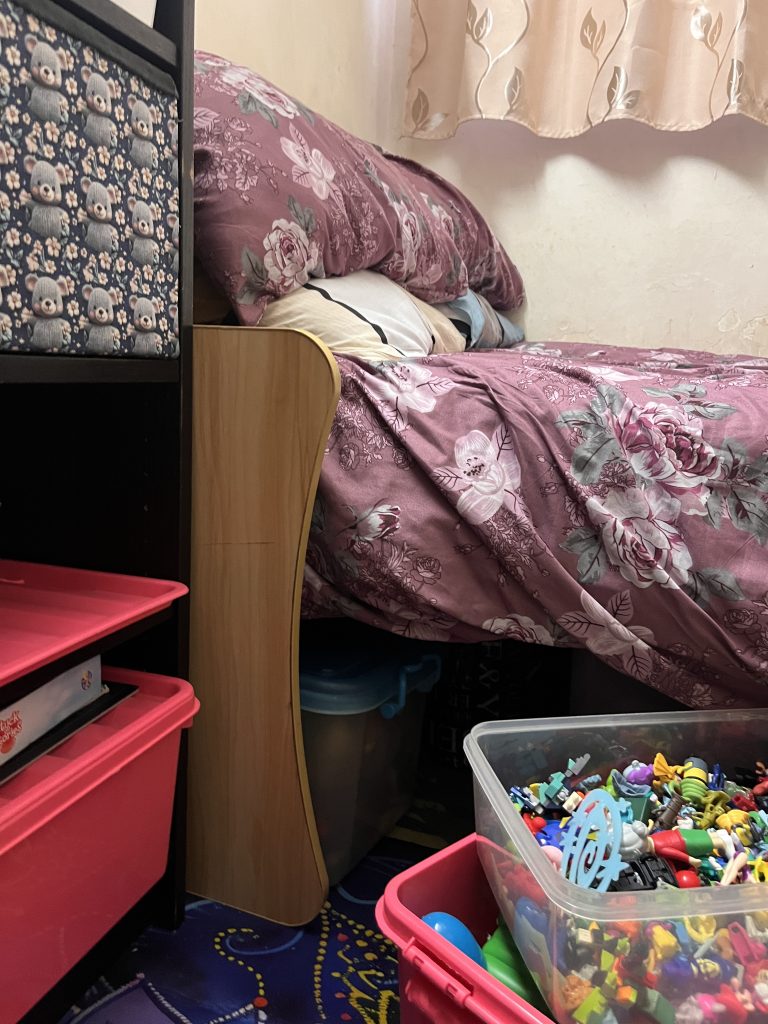
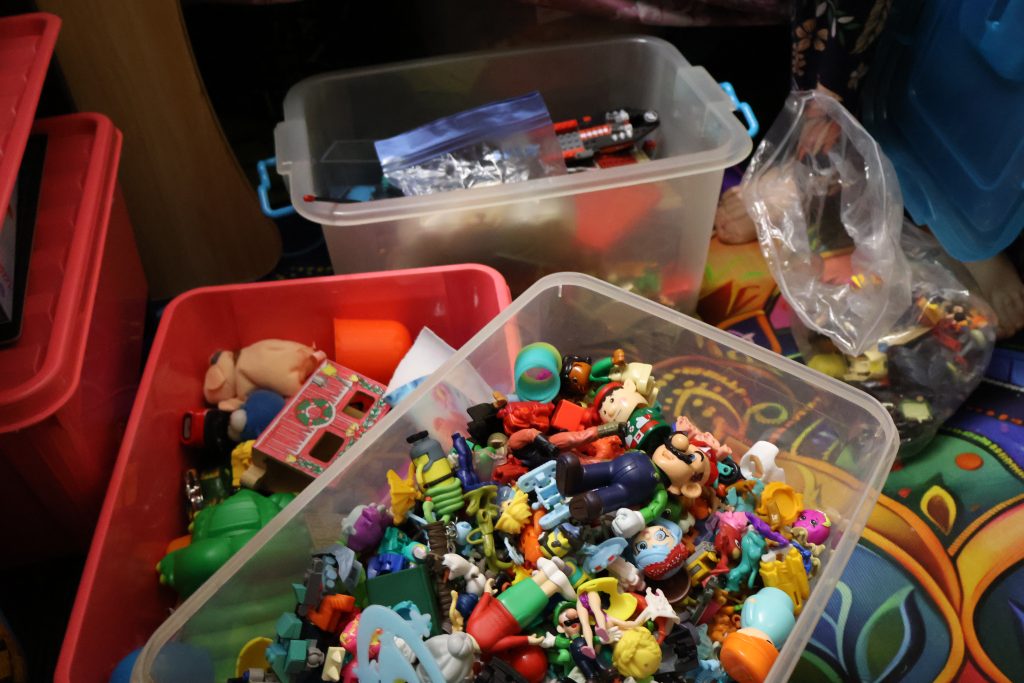
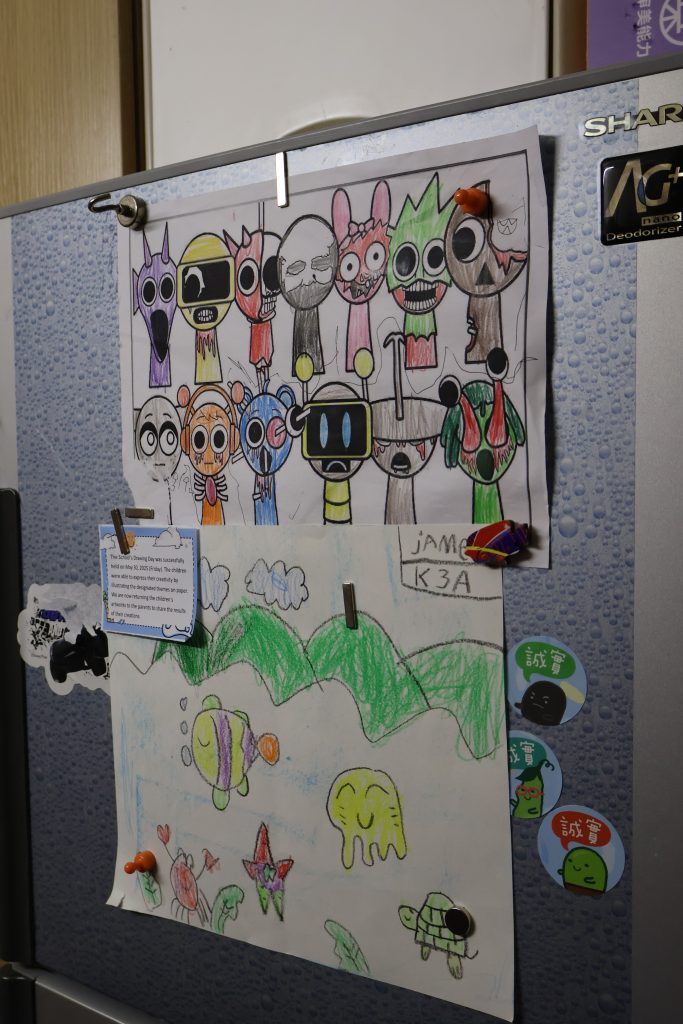

點亮方寸之地的希望 — STAR計劃守護他們的家、他們的親子時光
在香港這座繁華都市中,隱藏著許多不為人知的角落,居住著許多默默努力找出路的人。在僅約100平方呎的劏房裡,來自俄羅斯的單親媽媽Lisa(化名)與她6歲、剛踏入小學的兒子James,攜手構築一個充滿愛與希望的小天地。作為免遣返聲請人,Lisa的案件仍在漫長的處理過程中。受限於身份,她無法在港合法工作,生活的重擔與未來的不確定性,每天都在考驗著她的堅韌。
一個小小的家,滿載愛與希望
走進Lisa與James的家,地方雖小,卻處處透露溫馨。目光很快被牆上、家具上貼滿的色彩斑斕畫作和小手作吸引——這些充滿童趣的「寶藏」,是Lisa最珍視的驕傲。在這個寸金尺土的城市裡,Lisa用她的方式為滋養兒子的心靈:她在家中親手製作精巧的布藝小手作,這不僅是她排遣漫長等待時光的方式,更是向兒子傳遞愛與創造力的無聲課堂。
對於Lisa和James而言,這個小小的劏房不僅是棲身之所,更是他們抵禦外界風雨的溫暖堡壘。然而,維持這個「家」的基本運作——水電開支,對沒有固定收入的Lisa來說,曾經是心頭沈重的壓力。除了每月每人僅HK$1,200的政府微薄的資助食物現金卡(僅限指定超市使用,平均每天每人HK$40應付三餐),高昂且可能被業主濫收的水電費用,讓Lisa在悶熱的夏天猶豫是否開啟風扇或冷氣。這個通風不佳的狹小空間,稍不留神便成為健康的隱患,尤其是對正在成長的James。
STAR計劃:點亮生活,守護親子時光
希望枝子的STAR計劃為Lisa一家帶來轉機。透過水電費資助,看似解決的是賬單問題,實際帶來的卻是生活品質的提升和內心的安定。在酷熱的夏天,風扇與冷氣讓這個小空間保持基本舒適,守護James的健康與學習環境。他得以在明亮的燈光下專心做功課、閱讀課本。更重要的是,這份安穩為他們維繫了寶貴的親子空間。這份支持讓Lisa與James得以延續他們最珍貴的日常:「即使空間這麼小,我們依然很珍惜每晚在床上打開那張迷你小桌子,一起拼砌LEGO、玩玩具的時光。」
您的捐助,改變的不只是一張賬單
Lisa和James的故事,是STAR計劃眾多受助者及家庭的縮影。您的每一分捐助,不僅僅是支付了一筆水電費賬單。更是為這些家庭帶來了:
- 基本尊嚴:讓他們維持一個乾淨、安全、舒適的居住環境,免受經濟壓力的煎熬。
- 身心健康:確保孩子如James能在健康環境中成長學習,免於酷熱或黑暗的困擾。
- 親子聯繫:保留溫馨的家庭時刻,讓父母與孩子在逆境中仍能共享歡笑與愛。
- 希望的延續:讓他們感受到社會的關懷,知道在漫長的等待中並不孤單。
您的善心,點亮希望之光
在Lisa那貼滿畫作的狹小劏房裡,我們看到了一位母親無私的愛、一個孩子在逆境中綻放的創造力,以及您的善款通過STAR計劃化為實際的守護力量。
感謝您選擇與希望枝子同行,用行動支持這些等待曙光的人們。您的慷慨,正在香港的方寸之地,點亮一盞盞名為「希望」的燈光,讓愛與希望在最微小的角落綻放光芒。
After 12 years of navigating life in Hong Kong as asylum seekers while waiting for their non-refoulement claim to be approved, a Somali family of three was finally granted refugee status. Their journey was marked by immense challenges, but with support from Branches of Hope, they found stability and hope for a brighter future.
The parents met in Hong Kong and built their life together, welcoming their son into the world eight years ago. However, the family faced numerous difficulties over the years, including legal and medical hurdles. Branches of Hope stepped in to offer critical support, ensuring the family’s well-being and enabling them to live with dignity and security.
One of the family’s most pressing challenges was a legal case involving the father. Despite his efforts to obtain legal aid, his application was rejected, leaving the family in an unstable situation. Facing the risk of an unjust outcome, BOH carefully evaluated the case and decided to partially support the costs of a low-bono lawyer. This assistance played a vital role in resolving the legal matter. The family can now live freely without the constant fear of legal uncertainties, allowing them to focus on rebuilding their lives.
Beyond legal support, the family also faced challenges related to their son’s health. The child was diagnosed with ADHD at a level significant enough to require medication and specialized education. After undergoing assessment, doctors recommended that he attend a school for children with special educational needs (SEN) and take prescribed medication to support his development. Understanding the importance of early intervention and the financial strain this placed on the family, BOH stepped forward to cover a portion of the monthly medication costs. This consistent support has led to remarkable improvements in the child’s behavior and overall well-being.
Today, the boy is thriving. With proper medication and support, he has become more focused and is able to enjoy his favorite activities, including football training. His happiness and progress are a testament to the transformative impact of timely and compassionate intervention.
Now, after years of adversity, the family can finally set their hurdles aside and look forward to the future with hope. With their refugee status officially recognized, they may have an opportunity to be resettled to another country where they can rebuild their lives and explore new opportunities. This milestone marks the beginning of a new chapter for the family, one filled with possibilities and renewed optimism.
BOH’s assistance has empowered this family to overcome some of their most significant challenges, offering them the stability to move forward. The father and mother no longer bear the weight of legal and financial stress, while their son is growing into a happy and healthy child with a bright future ahead. This story reflects BOH’s commitment to supporting vulnerable families in our community, walking alongside them as they navigate their journey toward hope and a better tomorrow.
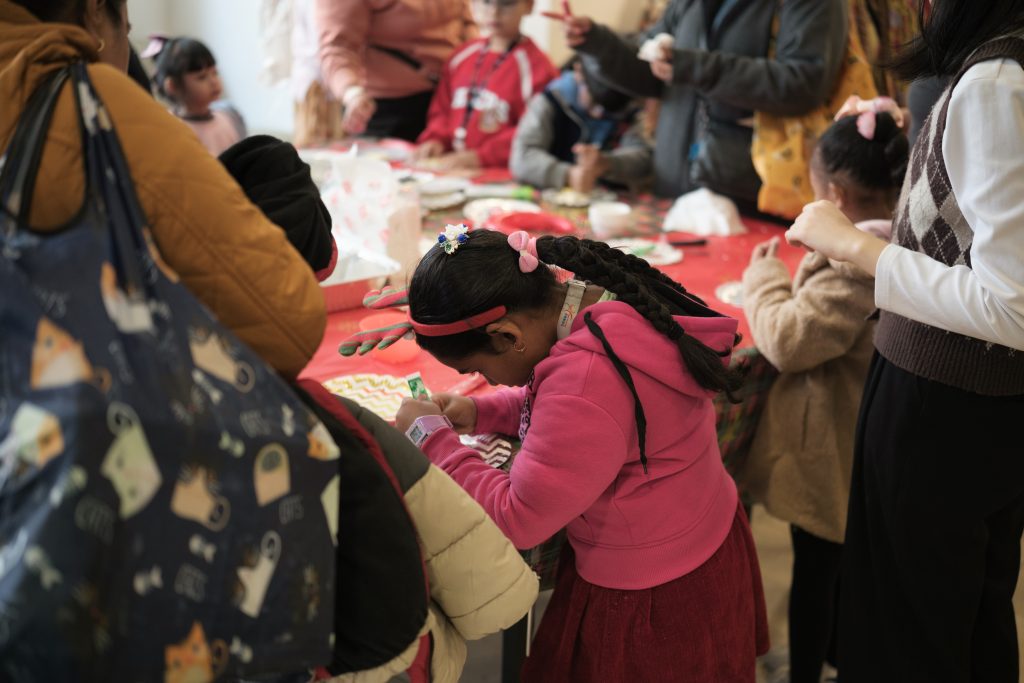
來自索馬里的一家三口在香港作為尋求庇護者生活12年,期間等待免遣返聲請獲批,終於成功取得難民身份。他們的旅程充滿了艱辛與挑戰,但在希望枝子的支持下,他們獲得了穩定的生活,並對未來燃起希望。
這對父母在香港相識相愛,攜手共建家庭,並於8年前迎來了他們的兒子。然而,多年來,家庭面臨諸多困難,包括法律糾紛與醫療問題。希望枝子介入並提供關鍵性的支援,確保這個家庭的身心健康,讓他們得以有尊嚴且安全地生活。
其中一個重大挑戰涉及父親的法律案件。儘管他積極申請法律援助,但他的申請仍被拒絕,使家庭陷入不穩定的處境。面對不公正結果的風險,希望枝子仔細審視案件詳情,決定部分資助公益律師費用。這項援助在解決法律問題上發揮了關鍵作用。現在,家庭無需再為法律不確定性而惴惴不安,能專注於重建生活,迎接新的開始。
除法律支持外,這個家庭還需應對兒子的健康問題。男孩被診斷患有過度活躍症 (ADHD),,病情嚴重,需接受藥物治療及特殊教育。經專業評估,醫生建議他入讀專為特殊教育需要(SEN)兒童而設的學校,並服用處方藥物來支援他的成長。鑑於早期介入的重要性及家庭的經濟壓力,希望枝子決定承擔每月部分藥物費用。 這種持續的支持顯著改善了男孩的行為表現與整體身心健康。
如今,男孩在適切的藥物治療與關懷下,變得更加專注,並能全心投入他喜愛的活動,包括足球訓練。他的快樂和進步證明了適時的介入及關心所帶來的正面影響。
現在,經歷了多年的逆境,這個家庭終於可以卸下重擔,並懷著希望展望未來。 隨著難民身份得到正式認可,他們有望移居至第三國,展開新生活,探索更多可能性。這一里程碑標誌著這個家庭新篇章的開始,充滿可能性和樂觀展望。
DIANA and her two children arrived in Hong Kong in 2024 and faced the challenges of adapting to a different environment. She sought a safe community but found the transition to Hong Kong both overwhelming and hopeless. She reached out to Branches of Hope (ROAD) for assistance and to avoid anyone from taking advantage of her.
When her children were enrolled in school through the education support programme, she was encouraged to join the Parents Support Group to help with her sense of isolation that came from navigating a new culture, language and social norms without any friends or family.
After joining the parents group, DIANA expressed genuine interest in learning and growing as she eagerly attended Parenting workshops and nail art training sessions. She made new friends from her home country and started feeling a sense of belonging and calm. With her warm smile and approachable demeanor, it made it easy for others to connect with her.
The enabling environment created an infectious sense of positivity and enthusiasm within her, and she shared her experiences and insights on parenting without any fear or hindrances. DIANA actively participated in discussions and contributed her ideas, encouraging others to do the same, which fostered a sense of community and togetherness. She became a leading participant of the Parent Support Group and her attitude inspired and motivated other members.
DIANA has now built strong ties with other community members who help one another with difficulties arising from their children’s education, especially communicating with teachers and helping their children with homework. Anytime you come across her, her face beams with smiles and hope.
“I am glad I joined the Parents Support Group. It has helped me and my children in so many ways, and I have learned a lot. I do not feel left out, alone or depressed anymore because I have got sisters around me to help.” She has expressed interest in joining more of ROAD’s activities because it makes her happy and keeps widening her knowledge base through useful workshops and skills acquisition.
The Parent Support Group has played a crucial role in the well-being of families of our community members (refugees and asylum seekers) by providing emotional support, shared knowledge, resources, skills development and community building. It has also motivated and encouraged community members by addressing specific needs, empowering parents, promoting mental health and opportunities for cultural exchange.
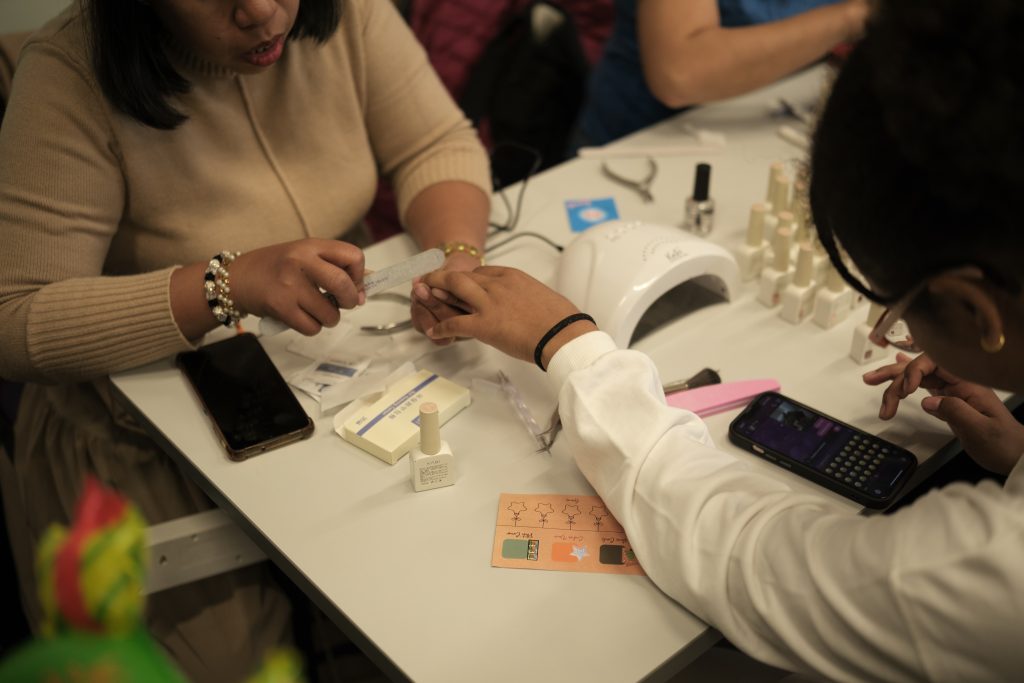
DIANA 帶著她的兩個孩子於 2024 年抵達香港,處於適應不同環境的過渡期,她面臨著種種挑戰。她嘗試尋求一個安全的社區,但發現適應香港的生活既讓人感到不知所措,又充滿希望。為尋求幫助並避免被他人利用,她聯繫了希望枝子 ROAD 團隊。
通過教育支援計劃,她的兩個孩子順利入讀學校。她受邀加入家長支援小組,以緩解因適應陌生文化、語言和社交規範,且缺乏親友支持而產生的孤立感。
加入家長支援小組後,DIANA 表現出對學習和成長的熱誠,積極參加親子工作坊和美甲培訓課程。她結織了來自她家鄉的新朋友,逐漸感受到歸屬感,這讓她內心平靜下來。她溫暖的笑容和平易近人的舉止,她輕鬆地與他人建立聯繫。
這種充滿支持的環境激發了她內心的積極和熱情,她毫無懼怕或障礙地分享了她在養育孩子方面的經驗和見解。DIANA 積極參與討論,貢獻她的想法,並鼓勵其他人也這樣做,從而培養了一種社區感和凝聚力。她成為家長支援小組的主要參與者,她的態度也啟發和激勵了其他成員。現在,DIANA已經與其他社區成員建立了深厚聯繫,彼此攜手應對子女教育中的挑戰,特別是在與老師溝通和指導孩子做功課方面。 每當遇到她時,她總是面帶笑容,滿懷希望。
「我很高興加入了家長支援小組。 它在很多方面幫助了我和我的孩子,讓我收穫頗豐。 我不再感到孤立無援或沮喪,因為身邊有姐妹們可以相互幫助。」 她表示有興趣參加更多 ROAD 的活動,因為這些活動不僅帶給她快樂,還通過實用的工作坊和技能培訓持續拓寬她的知識視野。
家長支援小組在促進社區成員(難民及免遣返聲請人)的身心健康方面發揮了不可或缺的作用,通過提供情緒支援、知識共享、資源整合、技能提升及社區凝聚力建設,顯著改善了他們的生活質素。該小組不僅滿足了特定需求,還通過賦能家長、促進心理健康及推動文化交流,激勵並鼓舞了社區成員,為他們帶來更多機遇與希望。
Padma had expressed her consent to return to her home country in Africa, along with her toddler, to the Immigration Department in Hong Kong in November 2023. She reached out to ROAD a month later, seeking assistance. During the intake assessment, conducted as part of our process when community members express a desire to return, we identified several key issues that Padma was facing. She was ambivalent about returning, whether she had made the right decision.
Furthermore, she had no family in her home country, as her parents were deceased, and she did not know whom to contact or seek support from upon her return. She considered reaching out to her only relative, who resided in a neighbouring country. At that point, Padma was uncertain about her departure date from Hong Kong, as she had not been given one by the Immigration Department. Combined with the helplessness in being kept in limbo, the weight of the decisions she had to make regarding her and her daughter’s safety and well-being overwhelmed her. She was experiencing low mood, lack of energy, difficulty concentrating, and poor sleep. Additionally, her toddler was displaying signs of developmental delay.
ROAD conducted additional sessions with Padma to prepare her for her return, assessing her readiness, identifying her needs, addressing logistical considerations, and assisting with document preparation. Although Padma initially hesitated to reach out to friends in Africa about her return, the sessions helped her evaluate the potential benefits and drawbacks, and she ultimately reached out to a friend who was delighted to receive her.
She also contacted her relative, who extended an invitation for her to visit once she obtained the necessary documentation, including a passport for her daughter, as he lived in a neighbouring country.
ROAD also referred Padma to counselling services to address her emotional well-being and equipped her with tools for parenting.
Proactively, Padma also reached out to another organisation that connected her with a local organisation in her home country, which offered six months of shelter and food assistance for Padma and her child. Despite the challenges, Padma pursued online courses so that it would enable her to take up some employment.
Eventually, just two days before her flight, Padma was informed of her departure by the Immigration Department. Despite the limited time ROAD managed to provide the financial support that we provide to returning community members. Padma also managed to complete the necessary requirements and returned home with a mixture of ambiguity and hope.
ROAD also facilitated a connection with an organisation offering free counselling services, ensuring that she could continue to receive emotional and psychological support. Padma and her daughter eventually left their home country and joined her only relative.
Padma’s story serves as an exemplar of how ROAD envisions supporting community members in their return journey. We continuously learn from these experiences to improve and make the transition home, safer and more dignified for individuals like Padma.
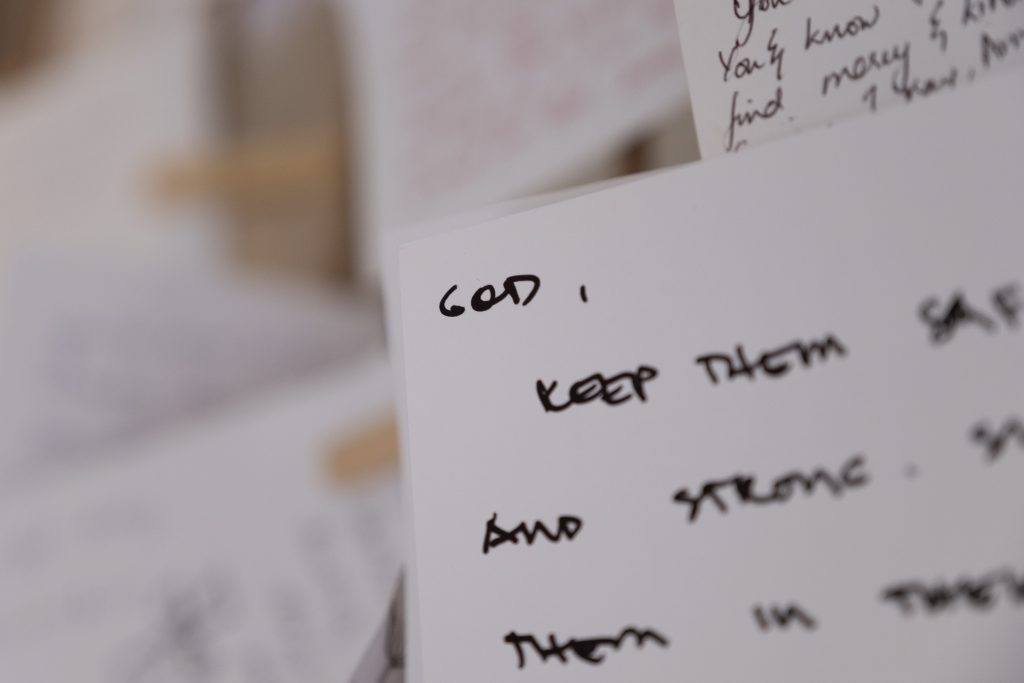
2023年11月,Padma向香港入境事務處表示,同意與年幼的孩子一起返回非洲原居地生活;一個月後,她向ROAD團隊求助。一如其他表示有意返回原居地的社區成員,我們與Padma進行評估,了解她面對的主要問題。結果顯示她對回國感到矛盾忐忑,對於自己的決定正確與否心生疑慮。
由於Padma的雙親已經離世,她在原居地舉目無親,回國後可謂求助無門。苦無對策之下,聯絡居於鄰國的唯一親屬彷彿成為了她的唯一出路。與此同時,Padma對自己何時離港毫無頭緒,入境事務處當時一直並沒向她透露確實日期。身不由己的處境讓Padma感到徬徨無助,而她明白,每項決定都對自己和女兒的安全和日後生活影響深遠。沉重的壓力令她出現情緒低落、倦怠、專注力下降和失眠症狀;另一邊廂,她的孩子亦出現發展遲緩的跡象。
為協助Padma準備回國,ROAD團隊與她進行多次會面,藉此評估她對於返國的就緒程度、了解她的需要、處理後勤問題和預備所須文件。最初,Padma對於聯絡非洲當地的朋友有所卻步,但經過多次會面,她在團隊成員協助下學會平衡當中利弊。Padma最終與一位朋友取得聯絡,並且獲得朋友的熱情回應,表示將會迎接她的歸來;她亦與身在家鄉鄰國的親人聯絡上,他邀請Padma到家作客,只要她和女兒的所須證件俱備,便可成行。
除此之外,ROAD團隊向Padma轉介輔導服務,協助她整理情緒及提供育兒資源。Padma亦主動向另一間機構求助,由該機構與家鄉的地區服務組織牽線,為她和孩子安排六個月的住宿和食物援助。此外,Padma更無懼重重挑戰,修讀網上課程,藉此提升技能,為回國後投入職場做好準備。
Padma終在航班出發兩日前獲入境事務處通知離港日期。儘管時間緊迫,ROAD團隊仍趕及在Padma離港前,向她發放我們給予自願遣返成員的經濟援助。成功完成既定流程後,Padma在一片困惑和希望之中步上歸途
ROAD團隊亦為Padma與當地的輔導組織牽線,讓她得以繼續接受免費情緒和心理支援。最後,Padma和她的女兒離開家鄉,與她們唯一的親人一起生活。
Padma的故事展現ROAD如何在社區成員的歸家之路上提供支援。我們不斷從這些經歷中學習,為每個像Padma一樣選擇重返故鄉的人維護尊嚴,讓他們得以安然回國,繼續生活。
Anna’s family faced numerous challenges as asylum seekers, including limited resources and the inability to work. Anna’s mother, Fiona, understood the transformative power of education and the opportunities it could provide for her family’s future. However, the family’s limited means made it difficult to afford even the basic necessities for Anna to attend school. The costs of transportation, school books, and other supplies seemed insurmountable. It was a constant worry for Fiona, as she wanted nothing more than to see her child receive a quality education.
Recognizing the importance of education in shaping a brighter future, Branches of Hope offered financial assistance through their programme, “Keeping Kids in Kindergarten.” With a grant of up to $7,000, the programme aimed to alleviate the financial burdens faced by families like Anna’s, enabling them to afford transportation, schoolbooks, uniforms, and other necessary expenses.
With the support received from Branches of Hope, Fiona’s worries began to dissipate. The organisation understood the challenges faced by asylum seeker families and the importance of providing holistic support.
The financial assistance they provided eased the burden on Fiona, allowing her to secure transportation for Anna. No longer did she have to worry about the long and costly commute to school. Fiona was relieved to know that Anna would have the opportunity to attend school regularly without the financial strain it would have otherwise caused.
As Anna settled into school life, Fiona witnessed the positive changes in her daughter’s growth and development. She saw Anna’s confidence blossoming, her love for learning flourishing, and her eagerness to explore new knowledge. With each passing day, Fiona’s hopes for Anna’s future grew. She dreamed of a life where her child would have opportunities she never had, where education would open doors to a world of possibilities.
Fiona’s story is just one example of the transformative power of education and the profound impact of Branches of Hope. Through Keeping Kids in Kindergarten Programme, they continue to uplift the lives of asylum seeker families, providing the necessary resources to pursue education. By offering financial assistance for transportation, school books, and essential supplies, they empower mothers like Fiona, reminding them that they are capable of creating a better future for their children.
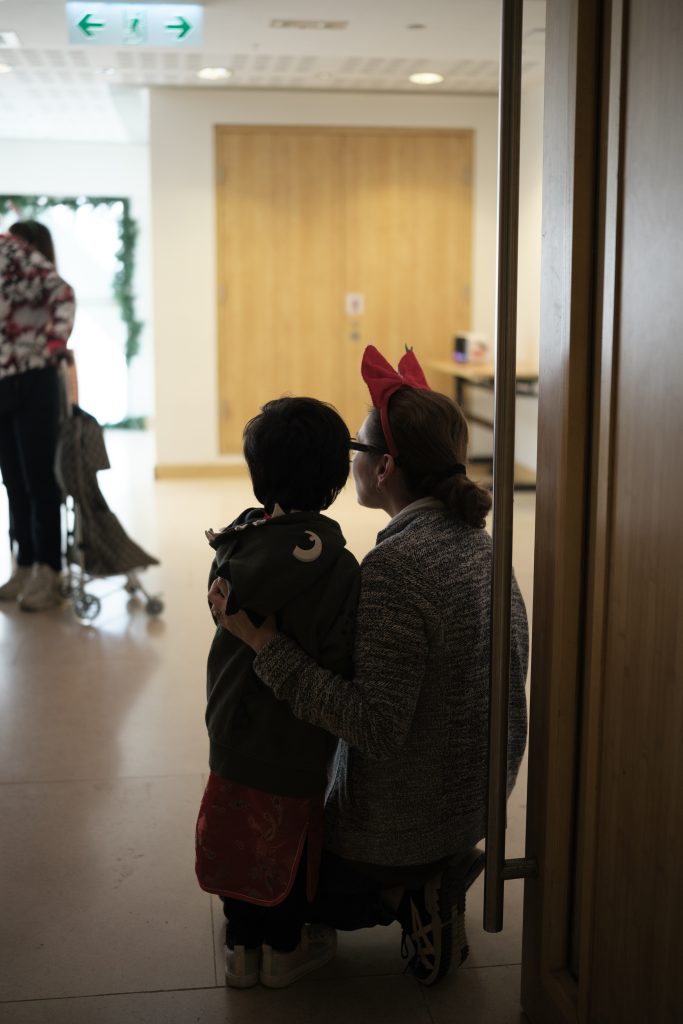
如同其他免遣返聲請人,Anna一家面對資源不足、在港不能工作等不同挑戰。Fiona是Anna的母親,她明白「知識就是力量」,深信知識可改變命運,學習能成就未來。可是,捉襟見肘的窘境讓她無法負擔女兒求學的基本開銷。不能負擔的交通費、書簿費和其他學校雜費,讓Fiona十分苦惱。而她別無所求,只希望女兒能接受良好的教育。
教育對個人發展至關重要,對決定未來有關鍵作用。希望枝子亦深明此道,遂透過幼稚園資助計劃(K3)向Anna提供幼兒教育的財政援助。K3計劃旨在協助與Anna面對相同困擾的家庭,透過提供$7,000資助,紓緩教育上的財政負擔,讓他們得以承擔交通費、書簿費、校服費用和其他必要開支。
在希望枝子的援助下,Fiona的憂慮開始變少。我們明白免遣返聲請人面臨的挑戰以及提供全面支持的重要性。希望枝子的經濟援助成功減輕Fiona的負擔,讓她得以支付Anna的校巴費用,毋須為女兒漫長且昂貴的上學路而擔憂。Fiona總算放下心頭大石,Anna將能繼續正常上學,不會因經濟壓力而影響她的求學路。
當Anna逐步適應校園生活時,Fiona亦從旁見證女兒的成長和變化。她看到Anna變得更有自信、更愛學習、更渴望發掘新事物。隨着時間過去,Fiona對Anna的希望日漸滋長,她夢想女兒能獲得她自己不曾得到過的機會,她夢想知識能將把她帶進充滿無限可能的世界……
Fiona和Anna的故事僅是希望枝子一直在社區深耕細作的其中一個例子,我們感恩能為社區成員帶來更深遠影響。我們將繼續透過K3項目,改善免遣返聲請人的生活,為他們送上求學路的所需資源,並藉着提供交通費、書簿費及雜費資助,為其他與Fiona面臨同樣困境的母親賦權,讓她們知道自己有能力為孩子創造更美好的將來。
Please note: Effective 12 March 2018, Vine Community Services Limited (VCSL) has changed its official name to Branches of Hope.

‘I feel like I’m at home at VCSL’
Silvia was forced to flee her home in Uganda in 2007. She came to VCSL in 2010, since then VCSL have not only helped improve living conditions for her and her children, both of whom are attending international kindergartens through our Keeping Kids in Kindergarten programme. From being a single woman with no friends or family, no one to sought out in a foreign place, Silvia now has a community of friends who support her and a place she can call home at VCSL. Her son is also attending a prestigious secondary school that welcomes and promotes diversity.
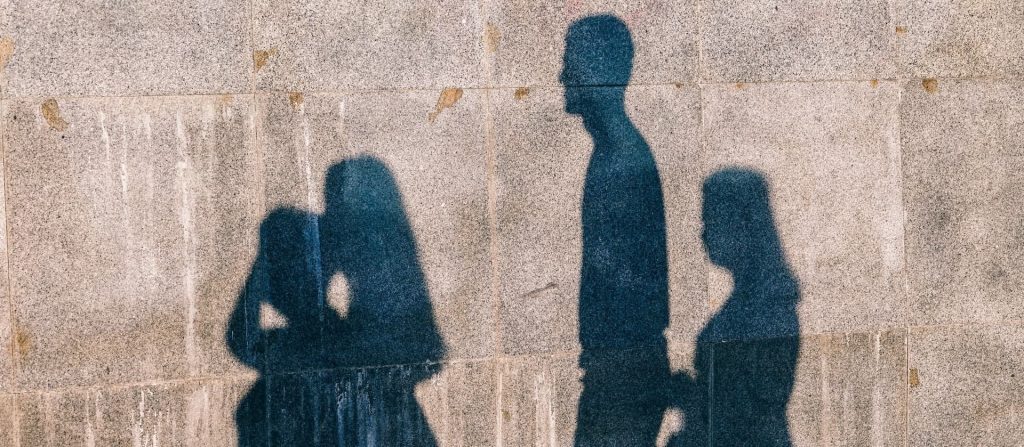
Married with two sons, Ra* from the Middle East is a pharmacist by profession. Charitable at heart, he made sure his company donated enough medicines to see the under-privileged get cure. Due to the political crisis, the Muslim Brotherhood extorted controlled drugs from pharmaceutical companies he worked for and sourced them to drug addicts to fund terrorism. Ra was adamant about his principles and refused to comply with the evil works of this movement.
Sadly, his family was viciously threatened due to his conviction of doing what is right. Ra bore scars from the ordeal and his family was traumatised. To save themselves, they fled to Hong Kong. This safe haven, where Ra and his family sought refuge, was not kind to them at first. Language barriers, a high cost of living, the lack of working rights due to his asylum-seeker status, and the uncertainty of his kids’ education were just some of the challenges they faced.
Eventually, Ra found hope in the initiatives of Branches of Hope. “We began to feel that everything will be ok,” Ra remembers. Our Education Programme Manager recognised his kids’ intellectual gift and reached out for scholarship opportunities with several international schools. At last, our efforts and Ra’s kids’ potential were realised.
Through our development programmes, Ra and his wife received advancement in their skills. Another affirmation he received was that he successfully secured visas for his wife and kids and they were relocated to another country safely. Ra graciously shared, “You are not only awakening hope in refugees like me and my family when you give; you are also helping us become self-reliant and changing our lives in the process.”
Ra’s story may be unfamiliar to many but it is present in our city. There are many like Ra who are in need of that out-stretched arm to experience hopefulness in the midst of trials. Admittedly, we will never be able to understand the lives they lead, but what we can do is bring light to their existence and acknowledge their needs.
One of the many challenges refugees and asylum seekers face is not being able to work.
*Name has been changed to protect the identity of the asylum seeker
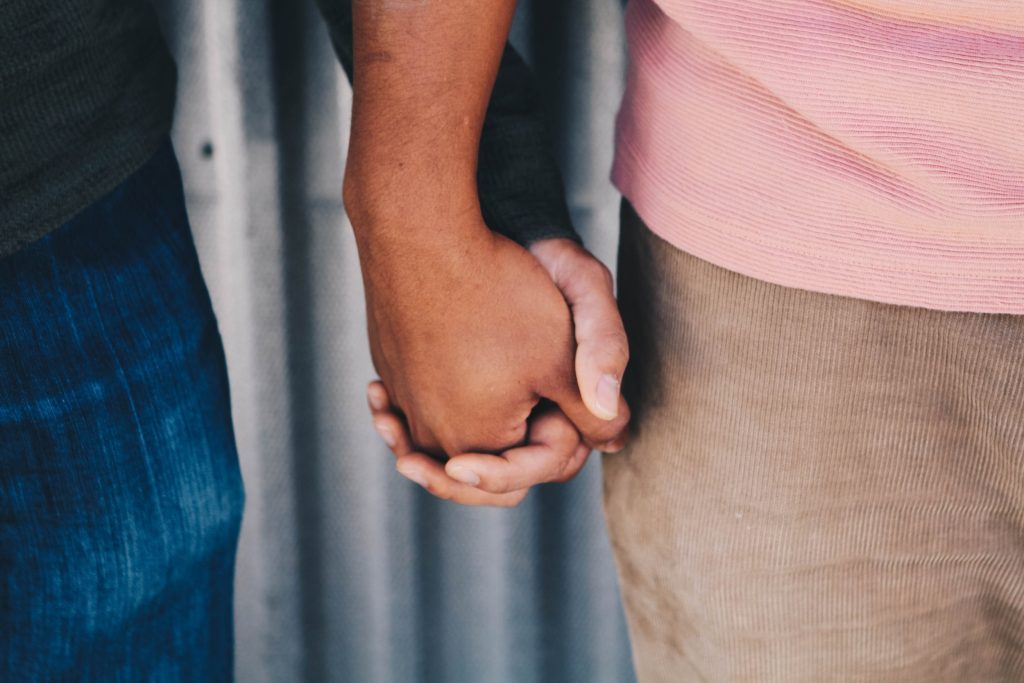
My story started long ago when I escaped to Hong Kong and met other refugees here from different parts of the world. We all have different stories to tell but have a common fear, the fear of persecution and death. This fear increases as social stigma and prejudices towards refugees become more prominent. The threat of deportation back to where they were persecuted arouses pure terror in the hearts of refugees everywhere. Their hopes start to fade and they would rather live on the streets than face the prospect of being deported.
People like me who decided not to feel bad about our situation focused instead on fighting back and holding on to our dreams. I did my best to integrate into mainstream society, learning the language and the culture, and loving the people and society. I also attended local gatherings and tried to understand why certain societies are hostile to refugees. I noticed one thing, they do not understand what refugees are. When different cultures come together, the host culture may sometimes feel threatened. I realised later that locals do not really hate refugees, they just do not understand who these people are and why we are here. From then on I adopted the strategy of going out and sharing our stories. Even now I reach out to schools, community events and individuals just to raise awareness about refugees.
There is an ever-present misconception about refugees. Some media representatives and politicians turn against refugees, doing their worst to paint them in a bad light. They create negative labels to drive people away so that nobody would want to support them. If you did offer support, you live in fear of being singled out by society, shunned by those who are ignorant to the situation. Many locals have fallen into this trap; they care about refugees but are afraid to break through the social prejudice and stand up for us.
Refugees are everywhere, globally. In the past, some that were rejected by the Hong Kong government have been accepted by other countries like Canada, US, Australia and New Zealand. The same people, the same story, rejected by one authority yet accepted by another. There are many refugee stories, and mine is one of the rare ones that has a happy ending. I received Permanent Residency in Hong Kong after my story reached a lady who showered me not with prejudice, but with love and compassion, because she knew my story and understood who I really am.
This lady took the heat from Hong Kong society because of her convictions, much like a refugee. She heard hate speeches and some of her friends deserted her. Despite it all, she proved to the world that neither a person’s skin color nor social status matters. What matters is his or her personality and reputation. This woman met me at the lowest point of my life, the moment when I thought my hope was completely gone. She took the risk no person her age would normally take and broke the wave of social stigma. I still remember the day she stood her ground against a huge man who said nasty things about me. She defended me with all her passion. I realised then that in society not everyone hates refugees. This reinforced words my father once told me, “Not everyone will love you and not everyone will hate you. Let those who love you influence your life, and learn from those who hate you to do better.”
I experienced the meaning of true love in a society that initially rejected me. I found a young woman whispering true love into the ears of a young man. We both vowed to make Hong Kong a more welcoming place for migrants of all kinds. We are both engaged in a peace-making project to remove the social stigma that society imposes on refugees. Today I can bring the message of love to Hong Kong because this society also brought the message of love into my life. She is my wife.
I believe in humanity. People like my wife, people like you, people who are far stronger and more influential than she is. People who embrace diversity and have compassion for the weak. We need people like you who will stand up and speak loudly for refugees and social justice in this city. If my wife can stand up for us, you can stand up even higher.
The refugee crisis is international in scope, but here in our own backyard it is our responsibility as justice-loving people, to help the thousands of refugees affected by war, persecution and human right abuses. Social inclusiveness is a culture that we all need to cultivate and embrace in this day and age. We must nurture a culture without prejudice to race, age, gender and beliefs, a culture that sees the world as one big community.
As Branches of Hope’s Manager for Refugee Opportunity and Development Programme, I am happy to contribute in transforming the lives of hundreds of refugees in our community and making our world a better place for all.
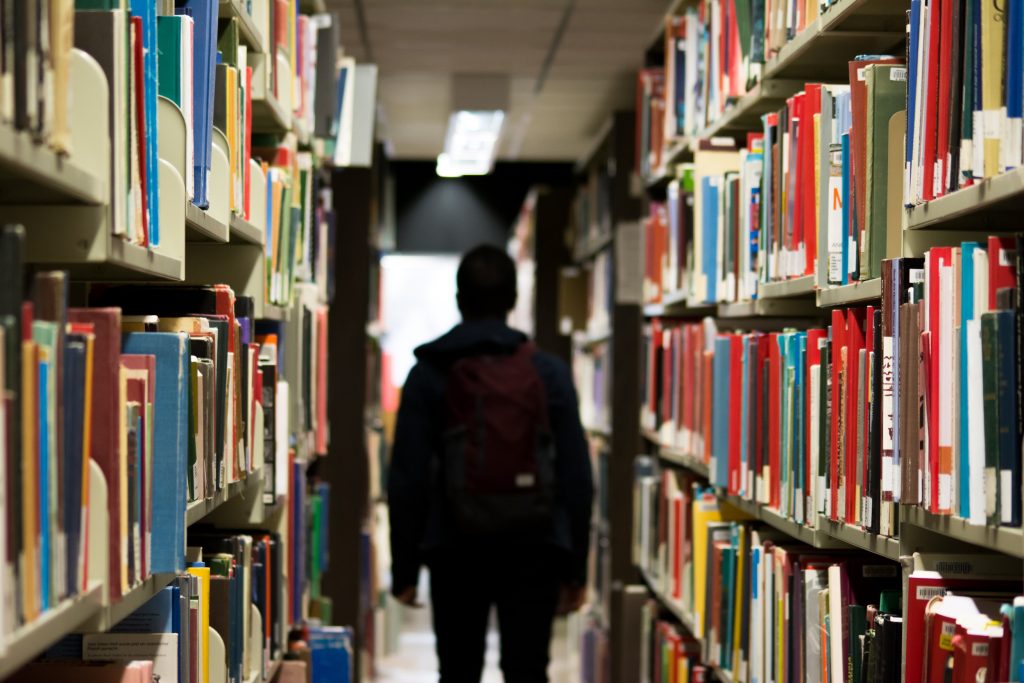
One of hundreds of refugee students in this fantastic city, I arrived Hong Kong in 2014.
When I first came with my family, I did not know anyone or anything. Everything was new to me, the language, the culture, the people etc. It was very difficult to communicate with people, as I had zero proficiency in the English language back then. It took me a long time to adapt to the new living environment.
Due to language requirements, I started my journey in secondary school, although having almost completed my secondary school in my home country. The education system was very different between my country and Hong Kong. It was very difficult for me to maintain my level of academic achievements; I was upset and frustrated as I tried my best in my studies. Within 6 months, I was able to communicate with my classmates and teachers. My progress surprised my teachers and my principal even told me that China offered me a scholarship since I was such a fast-learner!
Unfortunately, I was not able to leave Hong Kong due to my refugee status. I did not give up and kept going. Whatever I faced, I took them as a learning opportunity. The life of a refugee is not easy at all and I was forced to be in the situation. I thank God for saving my life and giving me this chance to a new one even though it is full of struggles and challenges. Through these experiences, I learnt a lot.
Another difficulty I faced was my living situation. The cost of living in Hong Kong is very expensive and since I am the eldest son, I felt the responsibility of providing a comfortable living environment for my family. However, for many reasons I cannot work, this means that I have no income. This made me nervous and I felt inefficient in terms of trying to maintain the quality of living for my family.
It is not easy when you move to a completely new country as a refugee. I did some internships in Hong Kong and I joined different human rights courses as well as spend my weekends teaching refugees English. I strongly believe that without education, I am nothing and I will have no value.
All these experiences have made me stronger and I have become a leader in my community. I am a co-founder of an organisation that stands for refugees in Hong Kong, providing good education to the people that do not have the opportunity and supporting young asylum seekers and refugees build their skills and equip them to become leaders. Along with our organisation, I am also leading a programme that feeds the homeless in Hong Kong. I proudly fight for our rights to live as human beings.
My current worries are the uncertainty of my life as a refugee, whether I can ever get out of this situation, I worry also for my family and our future. I am doing my best and taking action to find a way to help my family and myself. With this situation, I cannot do whatever I aspire to be doing and that is really hard for me.
What I worry most is how I am able to complete my higher education. My hope is to complete my education and to fight for human rights around the world. I want to create a platform for these people to speak up, to let the world hear their voice and for refugees to be seen. I am hopeful; I will not give up and will continue to take action.
By sharing my education journey, my message to refugees is “DO NOT GIVE UP!” Whatever happened, work hard, think positively, tomorrow will be better. Take an action to help yourself. Do not be ashamed because you are a refugee, you have no choice and you were forced to be in this situation. Use these challenges as life lessons to gain knowledge. We may be victims, but we fight to live through all the challenges we face every day!
To the people of Hong Kong, I love you from the bottom of my heart. I love Hong Kong city and I am very glad to be here despite my difficult living situation. I have hope that we can fight together to distribute love, justice and human rights that are missing in our lives.
Together, let us achieve equality.
*Photo is used for illustration purpose only.
*Some names and identifying details have been changed to protect the privacy of individuals.